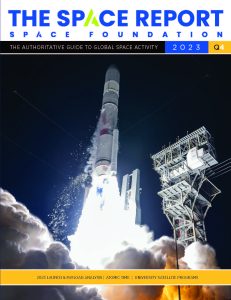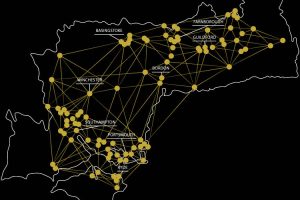As well as a record number of launches (for the third consecutive year), highlighted figures include commercial launch activity growing 50% year-over-year, a 23% increase in satellite deployment year-over-year, and 14 new launch vehicles being set to launch in 2024.
Launch activity
Specifically, global launch activity saw 223 launch attempts and 212 successful launches.
This resulted in more than 2,800 satellites being deployed into orbit, 23% more than in 2022.
While this total set a record for the most payloads ever deployed in a year, the percentage growth slowed slightly from 2022, where the number of satellites grew 36%.
According to the Space Foundation, the commercial sector dominated in terms of payload numbers: 90%, or 2,507 of the known satellites deployed, were commercial, versus 186 civil government spacecraft and 98 military satellites.
SpaceX deployments drove the majority of commercial payloads, accounting for 79% of deployments in that sector.
Launch vehicles
As mentioned, 14 new launch vehicles are expected to make maiden flights in 2024.
“Some of the new launch vehicles stem from big players including United Launch Alliance and Arianespace, but most come from small startups, including firms building the first orbital launchers for Australia and Argentina.”
Cooling
There are some signs of cooling for the sector, however.The Space Foundation writes:
“Despite 2023’s records, some indicators show slight cooling of the space economy. Mergers and acquisitions for space-related firms slowed in the fourth quarter of 2023, according to analysis by Quilty Analytics.”
“Additionally, the S-Network Space Index, which tracks a global portfolio of publicly traded companies that are active in space-related businesses, underperformed other benchmark indexes, declining 2.9% in 2023. But Q4 did bring good news for some space firms with an uptick in equity financing deals, a crucial lifeline for capital-intensive space startups.”
The global space ecosystem report, covering space exploration and space-to-Earth industries, is available on a subscription basis. You can find The Space Report 2023 Q4 here.
What’s the time?
Note that the Q4 edition of the report also considers time measurement in space – the relationship of satellite signals and leap seconds.
Specifically, how the International Telecommunication Union and technology companies are calling for the removal of leap seconds, resulting in arguments over how to exactly keep time in the future.
See also: Satellite broadband boosts global space economy reports Space Foundation
 Electronics Weekly Electronics Design & Components Tech News
Electronics Weekly Electronics Design & Components Tech News




